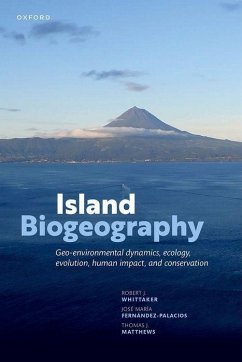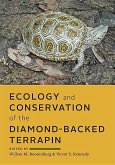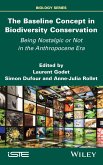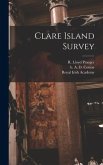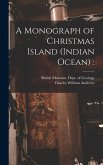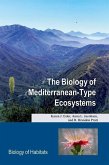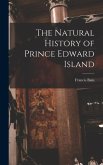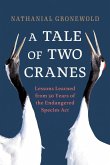Robert J Whittaker, José María Fernández-Palacios, Thomas J Matthews
Island Biogeography
Geo-Environmental Dynamics, Ecology, Evolution, Human Impact, and Conservation
Robert J Whittaker, José María Fernández-Palacios, Thomas J Matthews
Island Biogeography
Geo-Environmental Dynamics, Ecology, Evolution, Human Impact, and Conservation
- Gebundenes Buch
- Merkliste
- Auf die Merkliste
- Bewerten Bewerten
- Teilen
- Produkt teilen
- Produkterinnerung
- Produkterinnerung
A definitive new review of the island biogeography literature, explaining how islands have been used as natural laboratories in developing and testing ecological and evolutionary theories. Examines the chief threats to island species together with conservation strategies specifically tailored to islands.
Andere Kunden interessierten sich auch für
![Ecology and Conservation of the Diamond-Backed Terrapin Ecology and Conservation of the Diamond-Backed Terrapin]() Ecology and Conservation of the Diamond-Backed Terrapin86,99 €
Ecology and Conservation of the Diamond-Backed Terrapin86,99 €![The Baseline Concept in Biodiversity Conservation The Baseline Concept in Biodiversity Conservation]() The Baseline Concept in Biodiversity Conservation157,99 €
The Baseline Concept in Biodiversity Conservation157,99 €![Clare Island Survey Clare Island Survey]() Clare Island Survey34,99 €
Clare Island Survey34,99 €![A Monograph of Christmas Island (Indian Ocean) A Monograph of Christmas Island (Indian Ocean)]() Charles William AndrewsA Monograph of Christmas Island (Indian Ocean)40,99 €
Charles William AndrewsA Monograph of Christmas Island (Indian Ocean)40,99 €![The Biology of Mediterranean-Type Ecosystems The Biology of Mediterranean-Type Ecosystems]() Karen J EslerThe Biology of Mediterranean-Type Ecosystems147,99 €
Karen J EslerThe Biology of Mediterranean-Type Ecosystems147,99 €![The Natural History of Prince Edward Island The Natural History of Prince Edward Island]() Francis BainThe Natural History of Prince Edward Island32,99 €
Francis BainThe Natural History of Prince Edward Island32,99 €![A Tale of Two Cranes A Tale of Two Cranes]() Nathanial GronewoldA Tale of Two Cranes23,99 €
Nathanial GronewoldA Tale of Two Cranes23,99 €-
-
-
A definitive new review of the island biogeography literature, explaining how islands have been used as natural laboratories in developing and testing ecological and evolutionary theories. Examines the chief threats to island species together with conservation strategies specifically tailored to islands.
Hinweis: Dieser Artikel kann nur an eine deutsche Lieferadresse ausgeliefert werden.
Hinweis: Dieser Artikel kann nur an eine deutsche Lieferadresse ausgeliefert werden.
Produktdetails
- Produktdetails
- Verlag: Hurst & Co.
- Seitenzahl: 496
- Erscheinungstermin: 30. September 2023
- Englisch
- Gewicht: 1157g
- ISBN-13: 9780198868569
- ISBN-10: 0198868561
- Artikelnr.: 70703697
- Herstellerkennzeichnung
- Libri GmbH
- Europaallee 1
- 36244 Bad Hersfeld
- gpsr@libri.de
- Verlag: Hurst & Co.
- Seitenzahl: 496
- Erscheinungstermin: 30. September 2023
- Englisch
- Gewicht: 1157g
- ISBN-13: 9780198868569
- ISBN-10: 0198868561
- Artikelnr.: 70703697
- Herstellerkennzeichnung
- Libri GmbH
- Europaallee 1
- 36244 Bad Hersfeld
- gpsr@libri.de
Robert J. Whittaker is Professor of Biogeography in the School of Geography and the Environment at the University of Oxford and holds a part time professorial position at the Centre for Macroecology, Evolution, and Climate in the University of Copenhagen. He is a cofounder and past President of the International Biogeography Society. He is coauthor of Island Biogeography: Ecology, Evolution, and Conservation (OUP, 2006). His research interests span island biogeography, diversity theory, macroecology, and conservation biogeography. José María Fernández-Palacios is Full Professor of Ecology at the La Laguna University, Tenerife, Spain. He is an internationally recognised researcher on island ecology and biogeography, and in 2019 was elected President of the Society of Island Biology (SIB), a scientific association of island researchers and managers worldwide. He is coauthor of Island Biogeography: Ecology, Evolution, and Conservation (OUP, 2006). Tom Matthews is a Senior Research Fellow in the School of Geography, Earth and Environmental Sciences, University of Birmingham, UK. He researches global environmental change issues using macroecological, macroevolutionary and biogeographical approaches. He applies a mixture of theoretical and empirical methods to investigate various macroecological topics, including species-area relationships and species abundance distributions. He has a keen interest in island systems, and in particular the application of island theory to habitat island systems.
Preface and Acknowledgements
PART 1: Setting the Scene: Islands as Natural Laboratories
1: The natural laboratory paradigm
2: Island types, origins, and dynamics
3: Island environments
4: The biogeography of island life: biodiversity hotspots in context
PART 2: Island Ecology
5: Island macroecology
6: Assembly rules for island metacommunities
7: Extending the timescale: island biodynamics in response to island geodynamics
PART 3: Island Evolution
8: Colonization, evolutionary change, and speciation
9: Evolutionary diversification across islands and archipelagos
10: Island evolutionary syndromes in animals
11: Island evolutionary syndromes in - and involving - plants
PART 4: Human Impact and Conservation
12: The application of island theory to fragmented landscapes
13: The human transformation of island ecosystems
14: Anthropogenic extinction on islands: a synthesis
15: Meeting the conservation challenge
PART 1: Setting the Scene: Islands as Natural Laboratories
1: The natural laboratory paradigm
2: Island types, origins, and dynamics
3: Island environments
4: The biogeography of island life: biodiversity hotspots in context
PART 2: Island Ecology
5: Island macroecology
6: Assembly rules for island metacommunities
7: Extending the timescale: island biodynamics in response to island geodynamics
PART 3: Island Evolution
8: Colonization, evolutionary change, and speciation
9: Evolutionary diversification across islands and archipelagos
10: Island evolutionary syndromes in animals
11: Island evolutionary syndromes in - and involving - plants
PART 4: Human Impact and Conservation
12: The application of island theory to fragmented landscapes
13: The human transformation of island ecosystems
14: Anthropogenic extinction on islands: a synthesis
15: Meeting the conservation challenge
Preface and Acknowledgements
PART 1: Setting the Scene: Islands as Natural Laboratories
1: The natural laboratory paradigm
2: Island types, origins, and dynamics
3: Island environments
4: The biogeography of island life: biodiversity hotspots in context
PART 2: Island Ecology
5: Island macroecology
6: Assembly rules for island metacommunities
7: Extending the timescale: island biodynamics in response to island geodynamics
PART 3: Island Evolution
8: Colonization, evolutionary change, and speciation
9: Evolutionary diversification across islands and archipelagos
10: Island evolutionary syndromes in animals
11: Island evolutionary syndromes in - and involving - plants
PART 4: Human Impact and Conservation
12: The application of island theory to fragmented landscapes
13: The human transformation of island ecosystems
14: Anthropogenic extinction on islands: a synthesis
15: Meeting the conservation challenge
PART 1: Setting the Scene: Islands as Natural Laboratories
1: The natural laboratory paradigm
2: Island types, origins, and dynamics
3: Island environments
4: The biogeography of island life: biodiversity hotspots in context
PART 2: Island Ecology
5: Island macroecology
6: Assembly rules for island metacommunities
7: Extending the timescale: island biodynamics in response to island geodynamics
PART 3: Island Evolution
8: Colonization, evolutionary change, and speciation
9: Evolutionary diversification across islands and archipelagos
10: Island evolutionary syndromes in animals
11: Island evolutionary syndromes in - and involving - plants
PART 4: Human Impact and Conservation
12: The application of island theory to fragmented landscapes
13: The human transformation of island ecosystems
14: Anthropogenic extinction on islands: a synthesis
15: Meeting the conservation challenge

